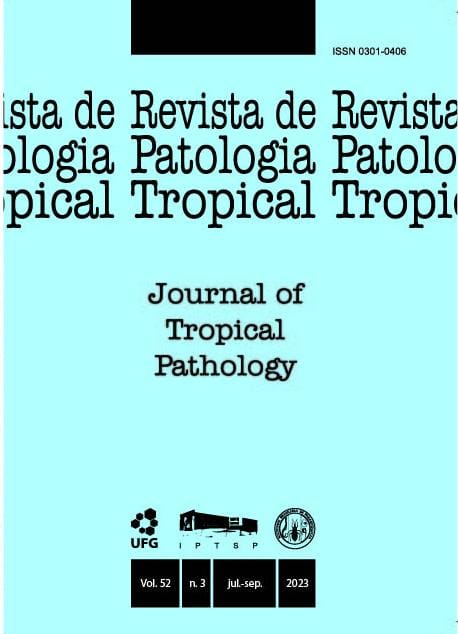Pulmonary mycobacteriosis: clinicalepidemiological profile of patients, treatment management, clinical outcome, and its species in the state of Mato Grosso, Brazil (2013-2020)
DOI:
https://doi.org/10.5216/rpt.v52i3.75557Resumo
This study aimed to describe the clinical-epidemiological profile of patients in the State of Mato Grosso, who were affected by non-tuberculous mycobacteria (NTM), treatment management, clinical outcomes, and the species most commonly isolated from clinical samples. Between 2013 and 2020, the study analyzed 37 medical records from the Health Pulmonology sector of the Reference Center for Medium and High Complexity and it searched the Laboratory Environment Manager (GAL) system of the Central Public Health Laboratory of Mato Grosso. Patients with mycobacteriosis were predominantly diagnosed with MAC complex (avium-intracellulare complex) (n= 23.6%), with an average age of 62 years old; 51.4% were male, Caucasian (62%), and predominantly immunocompetent (HIV-negative). Most patients with comorbidities were older adults, they had sequelae of previous tuberculosis (56.8%), they were smokers (62.2%), and they had a low body mass index (29.7%) due to weight loss. Other patients had bronchiectasis (81.1%) and cavitary lesions (48.6%), with a lower incidence of chronic obstructive pulmonary disease (COPD). The municipalities with the highest rates of nontuberculous mycobacteria were Cuiabá (14 cases), Várzea Grande (five cases), Sinop (two cases), Nova Mutum (two cases), and Rondonópolis (two cases). This study presented data from the region, with a clinical, epidemiological profile, diversity of NTM species, and treatment management according to the patient’s response to the specific treatment of the identified Mycobacterium and various outcomes.
KEY WORDS: Non-tuberculous mycobacteria; MAC complex Mycobacterium; comorbidities; tuberculosis; mycobacteriosis.
Downloads
Downloads
Publicado
Como Citar
Edição
Seção
Licença
The manuscript submission must be accompanied by a letter signed by all authors stating their full name and email address, confirming that the manuscript or part of it has not been published or is under consideration for publication elsewhere, and agreeing to transfer copyright in all media and formats for Journal of Tropical Pathology.

